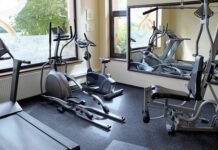Staying hydrated during a workout helps you to exercise to your personal best. If you allow yourself to get dehydrated, you may not be able to work out as hard as you’d like to.
Dehydration leads to a lack of stamina and can leave you feeling fatigued, lightheaded, dizzy or nauseous.
What is the best drink during a workout?
During your workout, you definitely want to stay hydrated. But should you stick with plain water, or go for a sports drink which contains electrolytes?
There are benefits to both!
Good Choice #1: Water
For light to moderate exercise, water is the best drink during workout.
When you are working out, you are sweating and it is necessary to replenish those fluids.
It is recommended that as you work out, you drink in response to your thirst signals. If you are really hot and sweaty, drink as much water as you need.
Try not to chug water quickly as it may lead to you getting cramps and feeling sick. Try to sip on water when you can, like between sets of exercises or if you have a quick break during your workout class.
Good Choice #2: Sports Drinks
Sports drinks, like Gatorade or Liquid IV may be a good choice for you if you are exercising heavily.
Because they contain some carbohydrates, sports drinks may provide you with a bit of energy to sustain you during your workout.
Of course, the main point of drinking a sports drink is to feel hydrated – so if you struggle with energy levels during a workout, the best course of action would be to eat a substantial meal beforehand.
Electrolytes in sports beverages may have added benefits during exercise. Potassium and sodium are found in most sports drinks and are used to replace and conserve fluids in the muscles. This may help you to feel less depleted during your workout.
Sports drinks also usually contain magnesium, which can help keep your heart beat steady and may also help to relieve muscle cramps. This may be a good idea for you if you are working out really intensely.
What not to drink during a workout:
Both sports drinks and water are great choices to keep you hydrated during your workout, but there are a few beverages that you should avoid when working out.
Bad Choice #1: Coffee
During a workout, drinking coffee will probably not do you any favors in terms of hydration. Coffee does not dehydrate you per se, but it is a diuretic that will cause you to urinate more frequently. While this may not cause you to become any more dehydrated than if you were not drinking coffee, it probably will not make you feel hydrated either.
As well as being a diuretic, coffee is also a mild laxative. This may have undesirable effects if you drink it during a workout – you might end up spending your workout in the bathroom!
Coffee may make a good pre-workout drink though, because it contains caffeine, which can give you some energy before a workout.
Bad Choice #2: Energy Drinks
Energy drinks, like coffee, contain caffeine – although most energy drinks contain two times more caffeine than an 8 oz coffee. Consuming this much caffeine during a workout may have some undesirable effects.
Caffeine is a stimulant and may raise your heart rate. While this stimulating effect can be useful before a workout (hence why so many people use pre-workout powders or beverages), it can be potentially dangerous during exercise.
During exercise, you are already raising your heart rate by vigorous movement. If you add a big dose of caffeine to the mix (say the 200mg that can be found in energy drinks), you could end up with a very fast and dangerous heartbeat.
When it comes to deciding what to drink during exercise, don’t overthink it! Many times plain old water will do the trick, or sipping on a sports drink may help you feel more hydrated during more intense exercise.

























